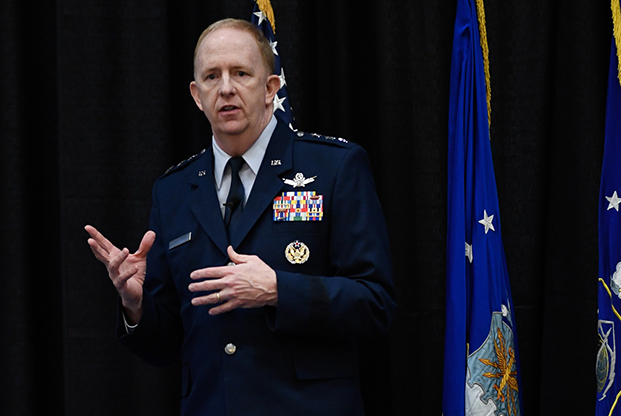
Lt. Gen. Robert McMurry, Air Force Life Cycle Management Center commander, delivers a State of LCMC address at a luncheon on Jan. 25, 2017 in Bedford, Massachusetts. Air Force photo by Mark Herlihy.
Air Force Life Cycle Management Center Commander Lt. Gen. Robert McMurry already has a to-do list for his future boss, once a four-star head of Air Force Materiel Command is confirmed.
At the top of his list is redesigning the organization, which oversees programs from development and fielding to sustainment and retirement, to mirror similar efforts at the Air Force Space and Missile Systems Center in California. He already believes AFLCMC is properly set up to work with portfolio architects like the one hired to oversee creation of an Advanced Battle Management System, which is intended to eventually replace the JSTARS aircraft.
“We need to look really hard at how LCMC is structured,” McMurry told reporters at a March 1 roundtable during AFA’s Air Warfare Symposium in Orlando, Fla. “I’m kind of invigorated a little bit by what I’ve seen with the Space and Missile Systems Center, with the shift of focus to a more diverse portfolio-management structure and a shift in the tiering of time. … I’d like to do that.”
But SMC, which oversees acquisition for about 100 programs under Air Force Space Command, is about one-twelfth of the size of AFLCMC, which spans the entire service and manages more than 1,200 programs.
“It is a tough go, though, because the pile of work is a little bigger,” McMurry said. “I’ve kind of been hoping I’d have a four-star boss to work that over with.”
That potential boss is expected to be Lt. Gen. Arnold Bunch, now the Air Force’s top uniformed acquisition official. He was nominated for a promotion to general and a new job last year, but must restart the confirmation process because senators did not approve his appointment by the time the 115th Congress ended.
The Trump administration will “eventually probably renominate” Bunch, McMurry said. McMurry has led AFMC in an interim capacity since its former chief, Gen. Ellen Pawlikowski, retired last September.
Another top priority is streamlining how the organization hires and retains workers. AFMC now averages a 40-day hiring process thanks to authorities granted by Congress, McMurry said, but keeping those people happy will take more work.
“I need to figure out how, when those people are hired, how to make them productive tomorrow,” he said. “The more they’re tied into the mission, the more they understand their impact on the mission, the more they understand the importance of what they do, the less likely that I’m going to lose them to some other organization.”
McMurry would like to change the systemic issues new hires face, such as long waits for base access, slow networks, and mandatory training. Failing to improve their workplace environment risks losing them to other branches of the military, government agencies, or private companies.
The Air Force Research Laboratory, which also falls under AFMC, recently completed a study on future workforce needs that could spur hiring changes as well.
“I think we have a fantastic mission,” McMurry said. “I want our people to feel that way, and feel that they’re contributing and [seeing] meaningful results from Day One. And I want them to understand the tie from what they do all the way to that unit in the field that benefits from their support.”